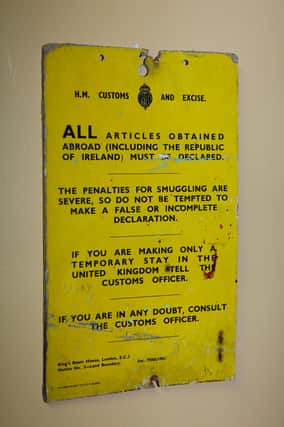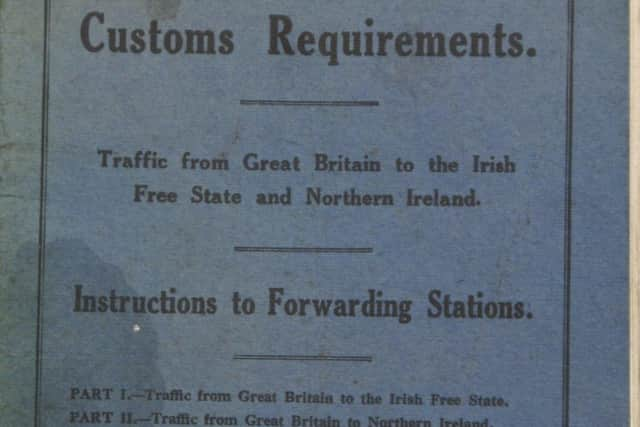To pay or not to pay for getting goods through Irish Customs in times past


Packed with customs officials’ handwritten details of the movement of all sorts of merchandise across the border between 1937 and 1945, the 100-page Register is an intriguing chronicle of confiscated goods and of the legal proceedings that were instigated against smugglers.
Donated to Headhunters Railway Museum in Enniskillen by Arlene Little, the register is predominantly a record of goods seized at Pettigo Railway Station’s customs post, operated by Eire’s customs and excise officials.
Advertisement
Hide AdAdvertisement
Hide AdThe border runs through Pettigo, this side called Tullyhommon, and just as interesting as the Irish Register is the British Government’s official Customs Requirements manual relating to “traffic from Great Britain to the Irish Free State and Northern Ireland”, printed in London in 1930.


It says “Private and not for publication” on the front cover, but presumably that’s not applicable after nearly a century!
As with the Seizure Register, the detail is intense, the wording is meticulous, the language is precise, and bureaucratic gobbledygook abounds!
Procedures are further complicated by the fact that the costings relate to dutiable and non-dutiable goods as well as to transport.
Advertisement
Hide AdAdvertisement
Hide AdThere are 26 tightly printed pages in two parts - one covering traffic from Great Britain to the Irish Free State (ten pages), and Part Two focusing on traffic from Great Britain to Northern Ireland (three pages).
There are also nine pages of appendices categorised under A, B and C packed with additional specifications and explanations, and four pages at the end containing an alphabetical index for traffic from Great Britain to the Irish Free State and a separate index for traffic from Great Britain to Northern Ireland.
The manual comprehensively detailed Customs Requirements for the UK’s Railway Clearing House (RCH), a mammoth operation originally set up in London in 1842 to clear or to apportion the receipts of the through traffic of Great Britain’s railways and of many Irish train companies and shipping ports.
Starting at the beginning of the manual today - more will follow - part one relates to merchandise and livestock carried by goods or passenger services from Great Britain to the Irish Free State
Immediately a very important regulation gets highlighted.
Advertisement
Hide AdAdvertisement
Hide AdWith the threat of “heavy penalties” for noncompliance, it clearly states that “a detailed declaration of contents, value, quantity, origin and final destination must be obtained in respect of all traffic to the Irish Free State.”
But this strict ruling doesn’t apply in five specific instances.
“Declarations are not required” the manual emphasises “for empty casks returned to Messrs A. Guinness, Sons and Co Ltd., Messrs John Jameson and Co Ltd., Messrs John Power and Son Ltd., Messrs Watkins, Jameson and Pim and The Mountjoy Brewery Company.”
British Customs and Excise undoubtedly knew their priorities!
Advertisement
Hide AdAdvertisement
Hide AdThe details of “the principle goods dutiable in the Irish Free State” as categorised, referenced and sub-referenced in the manual, are seemingly endless, with an added clarification “this list must not be taken as exhaustive and traders enquiring as to the liability of particular goods to duty are referred to the Irish Free State Official Import List.”
Before looking at a random selection from the list, a note about “Country of Origin or Production” rings a pertinent bell!
Concerning natural products, the manual defines the “Country of Origin or Production” as “the country where the goods were produced, and, in the case of manufactured products, the country where they were transformed into the condition in which they are introduced into the Irish Free State.
“In the case of mixed or blended goods containing constituents from different countries the quantity and value of such constituents must be shown separately.”
Advertisement
Hide AdAdvertisement
Hide AdAnd that particular declaration form must (in capital letters!) “be completed in duplicate” with full sender’s name as well as signature, and “a rubber stamp alone not permissible for signature”!
Today’s page ends with just some of the “Principle Goods Dutiable in the Irish Free State” in the 1930s, with another reminder “this list must not be taken as exhaustive”.
In alphabetical order, ‘A’ for Ale is followed by “Blacking (and polishes) containing sugar or other sweetening matter.”
Presumably it says on the tin whether or not the shoe polish is sweet or bitter, and staying with the letter ‘B’ are Boots (and shoes, including slippers, galoshes, clogs and sandals) with the important prerequisite “shaped rubber soles and heels to be attached.”
Advertisement
Hide AdAdvertisement
Hide AdBottles and jars (glass) (empty) were considered to be dutiable, as were, understandably, bottles and jars (glass) (containing dutiable goods)!
Next comes butter, then candles, cards (playing), chocolate and cider, with cocoa and currants (dried) all requiring full details in duplicate of Country(s) of Origin …and on through the alphabet via “knives, forks and spoons with wooden handles” and “rosaries and parts thereof” to “W” for Woven Tissues.
Woven Tissues are handkerchiefs, or ‘hankies’ as I used to call them as a child, but under British Customs Regulations they get the full treatment.
“Woven Tissues, made wholly or partly of wool, or worsted, imported in the piece - (i)of a width of 12 inches or more; (ii)or the weight of seven ounces or more per square yard; (iii)of a value exceeding 2s. 6d. per square yard.”
In other words - not to be sneezed at!
A message from the Editor:
Advertisement
Hide AdAdvertisement
Hide AdThank you for reading this story on our website. While I have your attention, I also have an important request to make of you.
In order for us to continue to provide high quality and trusted local news on this free-to-read site, I am asking you to also please purchase a copy of our newspaper whenever you are able to do so.
Our journalists are highly trained and our content is independently regulated by IPSO to some of the most rigorous standards in the world. But being your eyes and ears comes at a price. So we need your support more than ever to buy our newspapers during this crisis.
With the coronavirus lockdown having a major impact on many of our local valued advertisers - and consequently the advertising that we receive - we are more reliant than ever on you helping us to provide you with news and information by buying a copy of our newspaper when you can safely.
Advertisement
Hide AdAdvertisement
Hide AdYou can also enjoy unlimited access to the best news from across Northern Ireland and the UK by subscribing to newsletter.co.uk
With a digital subscription, you can read more than five articles, see fewer ads, enjoy faster load times, and get access to exclusive newsletters and content. Visit https://www.newsletter.co.uk/subscriptions now to sign up.
Thank you